Ayn Rand’s ‘Atlas Shrugged’: What the critics had to say in 1957
- Copy Link URL Copied!
“ There are two sides to every issue: One side is right and the other is wrong, but the middle is always evil. ” — Ayn Rand’s hero John Galt speaking in “Atlas Shrugged”
Ayn Rand’s novel “Atlas Shrugged” has polarized opinion for more than 50 years. Its fans — including, until recently, vice presidential candidate Paul Ryan — applaud the book’s celebration of rugged individualism and no-holds-barred capitalism. Its critics dismiss it as heartless, simplistic and elitist.
In the novel, many of the nation’s most brilliant and innovative entrepreneurs and business leaders have disappeared, leaving the nation in chaos. It turns out they have all departed for “Galt’s Gulch,” a secret and parallel society formed to show an increasingly government-dominated America how much it needs pure capitalism and the men and women who drive it.
In a 2005 speech, Ryan cited Ayn Rand as a key reason he went into politics. He said that he had made “Atlas Shrugged” required reading for his staff, and that he still liked to check his “premises” against passages from the book to be sure “that what I’m believing and doing and advancing are square with the key principles of individualism.” Lately, because Rand didn’t believe in God and because “Atlas Shrugged” celebrates an adulterous relationship between two of its main characters, Ryan has distanced himself from his former remarks, telling the National Review recently, “I reject her philosophy. It’s an atheist philosophy.” These days, he said in the interview, he favors Thomas Aquinas over Rand.
But even with all the controversy about the message of “Atlas Shrugged,” there’s been little discussion of its literary merits. Is it a great book? Here’s what the critics had to say at the time of its publication in fall 1957.
Robert R. Kirsch, Los Angeles Times:
It is probably the worst piece of large fiction written since Miss Rand’s equally weighty “The Fountainhead.” Miss Rand writes in the breathless hyperbole of soap opera. Her characters are of billboard size; her situations incredible and illogical; her story is feverishly imaginative. It would be hard to find such a display of grotesque eccentricity outside an asylum.
Granville Hicks, New York Times
Not in any literary sense a serious novel, it is an earnest one, belligerent and unremitting in its earnestness. It howls in the reader’s ear and beats him about the head in order to secure his attention, and then, when it has him subdued, harangues him for page upon page. It has only two moods, the melodramatic and the didactic, and in both it knows no bounds.
Edward Wagenknecht, Chicago Daily Tribune
There is much good sense in this book and it deserves more careful consideration than it is likely to get. For all that, Miss Rand is not quite the Moses to lead us out of the wilderness…. The worst thing in her book is her denunciation of what she calls mysticism, her ideas of which seem derived from Hitler rather than Meister Eckhardt or Rufus Jones. For her a mystic is a parasite in spirit and in matter, “a man who surrendered his mind at its first encounter with the minds of others.” No, Miss Rand, a mystic is a man who insists upon using those areas of his mind which you block off.
Helen Beal Woodward, Saturday Review
Miss Rand … throws away her considerable gifts for writing by fixing her reader with a glittering eye and remorselessly impressing upon him her convictions. These range from a hatred of Robin Hood as “the most immoral and the most contemptible” of all human symbols to a belief in a kind of chrome-plated laissez faire. Much of it is persuasive…. But Miss Rand is undone by her prolixity and her incontinence. She sets up one of the finest assortments of straw men ever demolished in print, and she cannot refrain from making her points over and over…. Altogether this is a strange, overwrought book.
Gigantic, relentless, often fantastic, this book is definitely not one to be swallowed whole. Throughout its 1,168 pages, Miss Rand never cracks a smile. Conversations deteriorate into monologues as one character after another laboriously declaims his set of values. One speech, the core of the book, spreads across 60 closely written pages. Yet once the reader enters this stark, strange world, he will likely stay with it, borne along by its story and its eloquent flow of ideas.
Paul Jordan-Smith, Los Angeles Times
A neighbor of mine who occasionally reviews books for an eastern magazine dropped in and, seeing the massive volume on my desk, asked what I thought of it. “Challenging and readable and quick with suspense,” I replied…. “a book every businessman should hug to his breast, and the first novel I recall to glorify the dollar mark and the virtue in profit….” But how the shabby little left-wingers are going to hate it!
Donald Malcolm, the New Yorker
Apparently Miss Rand set out to write a novel of social prophecy, something like “Nineteen Eighty-Four.” But while Orwell based his predictions upon the nature of the police state, the lady who gave us “The Fountainhead” has based hers upon — well, it is hard to say. Miss Rand’s villains resemble no one I have ever encountered, and I finally decided to call them “liberals,” chiefly because I can’t imagine whom else she might have in mind. In her vision of the future, then, the liberals have brought the world to a sorry plight. America is plunged into a catastrophic depression, caused by the government’s infernal meddling with the economy, and most of the other nations of the world have become People’s States, whose inhabitants are actually grubbing up roots to keep themselves alive. The last sparks of industrial competence are concentrated in the minds of two dozen — at most — American businessmen, who manage to hold the globe aloft in spite of the best efforts of governments everywhere to bring it down.
Hedda Hopper, in her syndicated column
Ayn Rand, although born in Europe is one of the finest American citizens I know. She worked with John Wayne, Gary Cooper, Clark Gable, Adolphe Menjou, Lela Rogers, Charles Coburn and a bunch of us when we formed the Motion Picture Alliance anti-commie group. She’s author of “The Fountainhead,” and has written a blockbuster of a book titled “Atlas Shrugged.” It runs 1,168 pages, and you won’t want to miss one word. I couldn’t put it down, neither will you be able to once you’ve started reading. You’ll say it can’t happen here — but it’s happening every day and we sit still while watching our rights as humans being whittled away.
Whittaker Chambers, National Review
“Atlas Shrugged” can be called a novel only by devaluing the term. It is a massive tract for the times. Its story merely serves Miss Rand to get the customers inside the tent, and as a soapbox for delivering her Message. The Message is the thing. It is, in sum, a forthright philosophic materialism. Upperclassmen might incline to sniff and say that the author has, with vast effort, contrived a simple materialist system, one, intellectually, at about the stage of the oxcart, though without mastering the principle of the wheel. Like any consistent materialism, this one begins by rejecting God, religion, original sin, etc. etc. (This book’s aggressive atheism and rather unbuttoned “higher morality,” which chiefly outrage some readers, are, in fact, secondary ripples, and result inevitably from its underpinning premises.) Thus, Randian Man, like Marxian Man, is made the center of a godless world…. Out of a lifetime of reading, I can recall no other book in which a tone of overriding arrogance was so implacably sustained. Its shrillness is without reprieve. Its dogmatism is without appeal.
Cary Schneider is library director at The Times. Sue Horton is Op-Ed editor.

More to Read
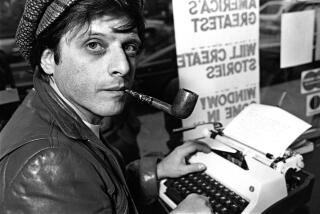
Sci-fi pioneer Harlan Ellison’s L.A. Shangri-la offers a window into his complicated soul
June 4, 2024

We’re living in a new age of McCarthyism, says author Patrick Nathan
June 3, 2024

The novel ‘Old King’ explores the meaning of ‘Unabomber’ Ted Kaczynski today
May 31, 2024
A cure for the common opinion
Get thought-provoking perspectives with our weekly newsletter.
You may occasionally receive promotional content from the Los Angeles Times.

Sue Horton returned to the Los Angeles Times as Op-Ed and Sunday Opinion editor in December 2018, then moved to a senior editor role before leaving the newsroom in July 2021. For four years before that, she was a Top News editor and West Coast bureau chief at Reuters. She held a variety of editing jobs at the Los Angeles Times between 2001 and 2014, including Op-Ed and Sunday Opinion editor and deputy California editor. Before her first stint at The Times, she was editor-in-chief of the L.A. Weekly for six years. Prior to that, she was a journalism professor at the University of Southern California. Horton started her journalism career working for Community Information Project, an investigative reporting nonprofit that did stories on contract with public television, “60 Minutes,” and a variety of newspapers and magazines. She is the author of a nonfiction book, “The Billionaire Boys Club,” which was the basis for an NBC miniseries. Horton has a bachelor of arts degree from the University of Redlands and a master’s in journalism from USC.
More From the Los Angeles Times

Letters to the Editor
Letters to the Editor: What ‘doom spiral’? Metro ridership is increasing
June 29, 2024

Editorial: Grants Pass ruling will do nothing to end homelessness

How a disillusioned Nigerian man’s trek to Europe becomes a test of faith and ambition

Litman: A Supreme Court ruling may help Jan. 6 rioters. Here’s why it’s less likely to help Trump
June 28, 2024
- Craft and Criticism
- Fiction and Poetry
- News and Culture
- Lit Hub Radio
- Reading Lists

- Literary Criticism
- Craft and Advice
- In Conversation
- On Translation
- Short Story
- From the Novel
- Bookstores and Libraries
- Film and TV
- Art and Photography
- Freeman’s
- The Virtual Book Channel
- Behind the Mic
- Beyond the Page
- The Cosmic Library
- The Critic and Her Publics
- Emergence Magazine
- Fiction/Non/Fiction
- First Draft: A Dialogue on Writing
- The History of Literature
- I’m a Writer But
- Lit Century
- Tor Presents: Voyage Into Genre
- Windham-Campbell Prizes Podcast
- Write-minded
- The Best of the Decade
- Best Reviewed Books
- BookMarks Daily Giveaway
- The Daily Thrill
- CrimeReads Daily Giveaway
News, Notes, Talk
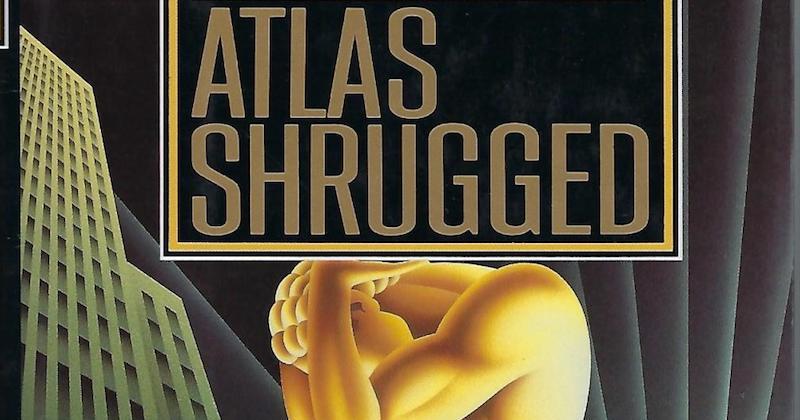
Read a 1957 review of Ayn Rand’s “excruciatingly awful” Atlas Shrugged .

Today is the sixty-sixth publication anniversary of Ayn Rand’s 1100-page magnum opus of unreadable doggerel libertarian science fiction, Atlas Shrugged .
Set in a dystopian United States in which private businesses suffer under increasingly burdensome laws and regulations (isn’t it always the way), it’s the story of railroad executive Dagny Taggart and her lover, steel magnate Hank Rearden, and their struggle against the “looters” who want to exploit their productivity.
Despite receiving largely negative reviews upon its release, the novel sold briskly and became a formative text for numerous conservative/libertarian ghouls politicians and thinkers, from Glenn Beck to Ayelet Shaked, Paul Ryan to Clarence Thomas.
One prominent conservative critic of Rand and her philosophy was William F. Buckley Jr., whose National Review published this scathing review of the novel by (Communist spy turned HUAC whistleblower turned book critic) Whittaker Chambers in December of ’57.
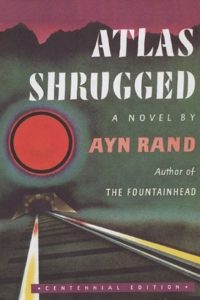
Run for your life from any man who tells you that money is evil. That sentence is the leper’s bell of an approaching looter .
“The news about this book seems to me to be that any ordinarily sensible head could not possibly take it seriously, and that, apparently, a good many do. Somebody has called it: ‘Excruciatingly awful.’ I find it a remarkably silly book. It is certainly a bumptious one. Its story is preposterous. It reports the final stages of a final conflict (locale: chiefly the United States, some indefinite years hence) between the harried ranks of free enterprise and the ‘looters.’ These are proponents of proscriptive taxes, government ownership, labor, etc., etc. The mischief here is that the author, dodging into fiction, nevertheless counts on your reading it as political reality. ‘This,’ she is saying in effect, ‘is how things really are. These are the real issues, the real sides. Only your blindness keeps you from seeing it, which, happily, I have come to rescue you from.’
Since a great many of us dislike much that Miss Rand dislikes, quite as heartily as she does, many incline to take her at her word. It is the more persuasive, in some quarters, because the author deals wholly in the blackest blacks and the whitest whites. In this fiction everything, everybody, is either all good or all bad, without any of those intermediate shades which, in life, complicate reality and perplex the eye that seeks to probe it truly. This kind of simplifying pattern, of course, gives charm to most primitive storyknown as: The War between the Children of Light and the Children of Darkness. In modern dress, it is a class war. Both sides to it are caricatures.
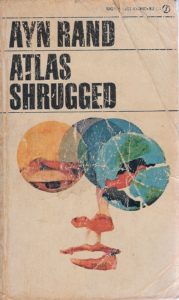
“…the strenuously sterile world of Atlas Shrugged is scarcely a place for children. You speculate that, in life, children probably irk the author and may make her uneasy. How could it be otherwise when she admiringly names a banker character (by what seems to me a humorless master-stroke): Midas Mulligan? You may fool some adults; you can’t fool little boys and girls with such stuff–not for long. They may not know just what is out of line, but they stir uneasily. The Children of Darkness are caricatures, too; and they are really oozy. But at least they are caricatures of something identifiable. Their archetypes are Left-Liberals, New Dealers, Welfare Statists, One Worlders, or, at any rate, such ogreish semblances of these as may stalk the nightmares of those who think little about people as people, but tend to think a great deal in labels and effigies.
In Atlas Shrugged , all this debased inhuman riffraff is lumped as ‘looters.’ This is a fairly inspired epithet. It enables the author to skewer on one invective word everything and everybody that she fears and hates. This spares her the playguy business of performing one service that her fiction might have performed, namely: that of examining in human depth how so feeble a lot came to exist at all, let alone be powerful enough to be worth hating and fearing. Instead, she bundles them into one undifferentiated damnation.
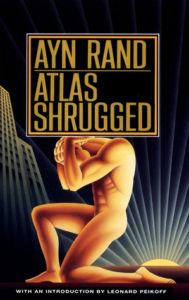
“So the Children of Light win handily by declaring a general strike of brains, of which they have a monopoly, letting the world go, literally, to smash. In the end, they troop out of their Rocky Mountain hideaway to repossess the ruins. It is then, in the book’s last line, that a character traces in the dir, over the desolate earth, the Sign of the Dollar, in lieu of the Sign of the Cross, and in token that a suitably prostrate mankind is at last ready, for its sins, to be redeemed from the related evils of religion and social reform (the ‘mysticism of mind’ and the ‘mysticism of muscle’). That Dollar Sign is not merely provocative, though we sense a sophomoric intent to raise the pious hair on susceptible heads. More importantly, it is meant to seal the fact that mankind is ready to submit abjectly to an elite of technocrats, and their accessories, in a New Order, enlightened and instructed by Miss Rand’s ideas that the good life is one which ‘has resolved personal worth into exchange value,’ ‘has left no other nexus between man and man than naked self interest, than callous ‘cash-payment.’ The author is explicit, in fact deafening, about these prerequisites. Lest you should be in any doubt after 1,168 pages, she assures you with a final stamp of the foot in a postscript: ‘And I mean it.’
“ Atlas Shrugged can be called a novel only by devaluing the term. It is a massive tract for the times. Its story merely serves Miss Rand to get the customers inside the tent, and as a soapbox for delivering her Message. The Message is the thing. It is, in sum, a forthright philosophic materialism.
“Randian Man, at least in his ruling caste, has to be held ‘heroic’ in order not to be beastly. And this, of course, suits the author’s economics and the politics that must arise from them. For politics, of course, arise, though the author of Atlas Shrugged stares stonily past them, as if this book were not what, in fact, it is, essentially–a political book. And here begins mischief. Systems of philosophic materialism, so long as they merely circle outside this world’s atmosphere, matter little to most of us. The trouble is that they keep coming down to earth. It is when a system of materialist ideas presumes to give positive answers to real problems of our real life that mischief starts. In an age like ours, in which a highly complex technological society is everywhere in a high state of instability, such answers, however philosophic, translate quickly into political realities. And in the degree to which problems of complexity and instability are most bewildering to masses of men, a temptation sets in to let some species of Big Brother solve and supervise them.
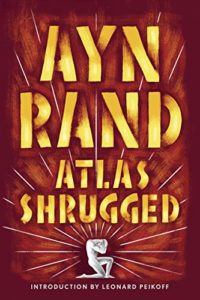
“Out of a lifetime of reading, I can recall no other book in which a tone of overriding arrogance was so implacably sustained. Its shrillness is without reprieve. Its dogmatism is without appeal. In addition, the mind which finds this tone natural to it shares other characteristics of its type. 1) It consistently mistakes raw force for strength, and the rawer the force, the more reverent the posture of the mind before it. 2) It supposes itself to be the bringer of a final revelation. Therefore, resistance to the Message cannot be tolerated because disagreement can never be merely honest, prudent, or just humanly fallible. Dissent from revelation so final (because, the author would say, so reasonable) can only be willfully wicked. There are ways of dealing with such wickedness, and, in fact, right reason itself enjoins them. From almost any page of Atlas Shrugged , a voice can be heard, from painful necessity, commanding: ‘To a gas chamber–go!’
“…we cannot help feeling at least a sympathetic pain before the sheer labor, discipline, and patient craftsmanship that went to making this mountain of words. But the words keep shouting us down. In the end that tone dominates. But it should be its own antidote, warning us that anything it shouts is best taken with the usual reservations with which we might sip a patent medicine. Some may like the flavor. In any case, the brew is probably without lasting ill effects. But it is not a cure for anything. Nor would we, ordinarily, place much confidence in the diagnosis of a doctor who supposes that the Hippocratic Oath is a kind of curse.”
– Whittaker Chambers, The National Review , December 28, 1957
to the Lithub Daily
June 24 – 28, 2024.

- The hottest new trend in publishing: Monster smut
- The Baillie Gifford boycotts and the necessity of sustainable, ethical sources of arts funding
- Kevin Nguyen on what Game of Thrones did to media

Lit hub Radio

- RSS - Posts
Literary Hub
Created by Grove Atlantic and Electric Literature
Sign Up For Our Newsletters
How to Pitch Lit Hub
Advertisers: Contact Us
Privacy Policy
Support Lit Hub - Become A Member
Become a Lit Hub Supporting Member : Because Books Matter
For the past decade, Literary Hub has brought you the best of the book world for free—no paywall. But our future relies on you. In return for a donation, you’ll get an ad-free reading experience , exclusive editors’ picks, book giveaways, and our coveted Joan Didion Lit Hub tote bag . Most importantly, you’ll keep independent book coverage alive and thriving on the internet.

Become a member for as low as $5/month
- ADMIN AREA MY BOOKSHELF MY DASHBOARD MY PROFILE SIGN OUT SIGN IN
ATLAS SHRUGGED
by Ayn Rand ‧ RELEASE DATE: Oct. 10, 1957
One finds oneself virtually under an indefinable compulsion to keep reading once caught in the mesh of sheer story telling as Ayn Rand weaves the strands of her fantasy. With one part of reason, one tries to reject the grim horror of the portrait she draws of the final bastion of the once free world falling into a new sort of Dark Ages. The sins of the power magnates are taking their toll. In terror over the threat to their security contained in the ruthless drive of a few leaders of industry, they sell out their initiative, their imagination, their creative powers, their right to independence of thought and action to government, in exchange for imagined security of regulation and strangulation. The thinkers, the creators, the doers, the free spirits fade out of the picture; those who remain label them deserters and traitors. But a few of them, under the leadership of the freest spirits, lay the groundwork for a new social order. Their philosophy has much that will shock the conventional; their oath — "...I will never live for the sake of another man, nor ask another man to live for mine" — seems to contain a negation of the code of humanity. There seems a warped sort of approach to a materialistic touchstone. The insistence on the godlike quality of the leader is never quite carried out in the characterization. In fact, for this reader, most of the characters are unconvincing, overdrawn to represent symbols rather than people. This- for me- was true of The Fountainhead some 14 years ago. Then, too, the machinery of the story was compelling, fascinating; the philosophic content had something faintly phoney; the characters were two dimensional.... Atlas Shrugged holds a terrifying immediacy, if one can envision today's prosperity holding the seeds of tomorrow's decadence. Except in the isolated cases of unrealized potentials of invention, she has tapped few of the now-evident clues to our immediate mechanical future. One finds it difficult to gauge the time span here. The market? Curiosity will be high pressured by the promotion and publicity:- an unheard of advance to the author; a tremendous advertising appropriation; a spirited bidding for subsidiary rights; a predicted advance sale of 60,000 copies out of an initial 75,000 printing... The sheer size of the book — about 1150 pages — is a magnet for an astounding number of readers.... The story is a challenging one; the manner of the telling holds reader interest, despite the unnecessary length; there's enough of sex to provide its mead of shockers; and there is the odd allure of fantasy, a sort of science fiction appeal. And one can count, too, on a goodly number who will discuss the social philosophy with heated arguments, pro and con — plus the intellectual snob appeal of those who like to feel they've plumbed a new code of ethics. It is not a book that leaves one unscathed.
Pub Date: Oct. 10, 1957
ISBN: 0452011876
Page Count: 1168
Publisher: Random House
Review Posted Online: Nov. 2, 2011
Kirkus Reviews Issue: Oct. 1, 1957
LITERARY FICTION
Share your opinion of this book
More by Ayn Rand

BOOK REVIEW
by Ayn Rand

by Ayn Rand adapted by Charles Santino illustrated by Joe Staton

THE SECRET HISTORY
by Donna Tartt ‧ RELEASE DATE: Sept. 16, 1992
The Brat Pack meets The Bacchae in this precious, way-too-long, and utterly unsuspenseful town-and-gown murder tale. A bunch of ever-so-mandarin college kids in a small Vermont school are the eager epigones of an aloof classics professor, and in their exclusivity and snobbishness and eagerness to please their teacher, they are moved to try to enact Dionysian frenzies in the woods. During the only one that actually comes off, a local farmer happens upon them—and they kill him. But the death isn't ruled a murder—and might never have been if one of the gang—a cadging sybarite named Bunny Corcoran—hadn't shown signs of cracking under the secret's weight. And so he too is dispatched. The narrator, a blank-slate Californian named Richard Pepen chronicles the coverup. But if you're thinking remorse-drama, conscience masque, or even semi-trashy who'll-break-first? page-turner, forget it: This is a straight gee-whiz, first-to-have-ever-noticed college novel—"Hampden College, as a body, was always strangely prone to hysteria. Whether from isolation, malice, or simple boredom, people there were far more credulous and excitable than educated people are generally thought to be, and this hermetic, overheated atmosphere made it a thriving black petri dish of melodrama and distortion." First-novelist Tartt goes muzzy when she has to describe human confrontations (the murder, or sex, or even the ping-ponging of fear), and is much more comfortable in transcribing aimless dorm-room paranoia or the TV shows that the malefactors anesthetize themselves with as fate ticks down. By telegraphing the murders, Tartt wants us to be continually horrified at these kids—while inviting us to semi-enjoy their manneristic fetishes and refined tastes. This ersatz-Fitzgerald mix of moralizing and mirror-looking (Jay McInerney shook and poured the shaker first) is very 80's—and in Tartt's strenuous version already seems dated, formulaic. Les Nerds du Mal—and about as deep (if not nearly as involving) as a TV movie.
Pub Date: Sept. 16, 1992
ISBN: 1400031702
Page Count: 592
Publisher: Knopf
Review Posted Online: May 19, 2010
Kirkus Reviews Issue: July 1, 1992
More by Donna Tartt

by Donna Tartt

More About This Book

SEEN & HEARD

HOUSE OF LEAVES
by Mark Z. Danielewski ‧ RELEASE DATE: March 6, 2000
The story's very ambiguity steadily feeds its mysteriousness and power, and Danielewski's mastery of postmodernist and...
An amazingly intricate and ambitious first novel - ten years in the making - that puts an engrossing new spin on the traditional haunted-house tale.
Texts within texts, preceded by intriguing introductory material and followed by 150 pages of appendices and related "documents" and photographs, tell the story of a mysterious old house in a Virginia suburb inhabited by esteemed photographer-filmmaker Will Navidson, his companion Karen Green (an ex-fashion model), and their young children Daisy and Chad. The record of their experiences therein is preserved in Will's film The Davidson Record - which is the subject of an unpublished manuscript left behind by a (possibly insane) old man, Frank Zampano - which falls into the possession of Johnny Truant, a drifter who has survived an abusive childhood and the perverse possessiveness of his mad mother (who is institutionalized). As Johnny reads Zampano's manuscript, he adds his own (autobiographical) annotations to the scholarly ones that already adorn and clutter the text (a trick perhaps influenced by David Foster Wallace's Infinite Jest ) - and begins experiencing panic attacks and episodes of disorientation that echo with ominous precision the content of Davidson's film (their house's interior proves, "impossibly," to be larger than its exterior; previously unnoticed doors and corridors extend inward inexplicably, and swallow up or traumatize all who dare to "explore" their recesses). Danielewski skillfully manipulates the reader's expectations and fears, employing ingeniously skewed typography, and throwing out hints that the house's apparent malevolence may be related to the history of the Jamestown colony, or to Davidson's Pulitzer Prize-winning photograph of a dying Vietnamese child stalked by a waiting vulture. Or, as "some critics [have suggested,] the house's mutations reflect the psychology of anyone who enters it."
Pub Date: March 6, 2000
ISBN: 0-375-70376-4
Page Count: 704
Publisher: Pantheon
Kirkus Reviews Issue: Feb. 1, 2000
More by Mark Z. Danielewski

by Mark Z. Danielewski

- Discover Books Fiction Thriller & Suspense Mystery & Detective Romance Science Fiction & Fantasy Nonfiction Biography & Memoir Teens & Young Adult Children's
- News & Features Bestsellers Book Lists Profiles Perspectives Awards Seen & Heard Book to Screen Kirkus TV videos In the News
- Kirkus Prize Winners & Finalists About the Kirkus Prize Kirkus Prize Judges
- Magazine Current Issue All Issues Manage My Subscription Subscribe
- Writers’ Center Hire a Professional Book Editor Get Your Book Reviewed Advertise Your Book Launch a Pro Connect Author Page Learn About The Book Industry
- More Kirkus Diversity Collections Kirkus Pro Connect My Account/Login
- About Kirkus History Our Team Contest FAQ Press Center Info For Publishers
- Privacy Policy
- Terms & Conditions
- Reprints, Permission & Excerpting Policy
© Copyright 2024 Kirkus Media LLC. All Rights Reserved.
Popular in this Genre
Hey there, book lover.
We’re glad you found a book that interests you!
Please select an existing bookshelf
Create a new bookshelf.
We can’t wait for you to join Kirkus!
Please sign up to continue.
It’s free and takes less than 10 seconds!
Already have an account? Log in.
Trouble signing in? Retrieve credentials.
Almost there!
- Industry Professional
Welcome Back!
Sign in using your Kirkus account
Contact us: 1-800-316-9361 or email [email protected].
Don’t fret. We’ll find you.
Magazine Subscribers ( How to Find Your Reader Number )
If You’ve Purchased Author Services
Don’t have an account yet? Sign Up.
- Non-Fiction
- Author’s Corner
- Reader’s Corner
- Writing Guide
- Book Marketing Services
- Write for us
Book Review: Atlas Shrugged by Ayn Rand
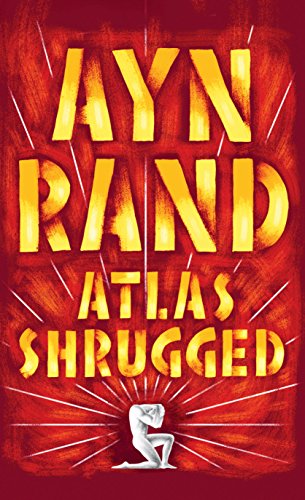
Author: Ayn Rand
Publisher: Random House
Genre: Philosophical fiction
First Publication: 1957
Language: English
Major Characters: Dagny Taggart, John Galt, Prometheus (mythology), Atlas, Hank Rearden, Francisco d’Anconia, James Taggart
Setting Place: The United States
Theme: The importance of the mind; the evils of collectivism; the need to integrate mind and body
Narration: an anonymous third-person narrator focusing mainly on Dagny and Rearden, but following all the characters.
Book Summary: Atlas Shrugged by Ayn Rand
Who is John Galt? When he says that he will stop the motor of the world, is he a destroyer or a liberator? Why does he have to fight his battles not against his enemies but against those who need him most? Why does he fight his hardest battle against the woman he loves?
You will know the answer to these questions when you discover the reason behind the baffling events that play havoc with the lives of the amazing men and women in this book. You will discover why a productive genius becomes a worthless playboy…why a great steel industrialist is working for his own destruction…why a composer gives up his career on the night of his triumph…why a beautiful woman who runs a transcontinental railroad falls in love with the man she has sworn to kill.
Atlas Shrugged, a modern classic and Rand’s most extensive statement of Objectivism—her groundbreaking philosophy—offers the reader the spectacle of human greatness, depicted with all the poetry and power of one of the twentieth century’s leading artists.
In early 1945, Ayn Rand embarked on the work which would eventually be considered her literary masterpiece. With a working title of The Strike, she diligently filled numerous notebooks, detailing her characters, plot, and theme, amongst others. Not for an audience, “ but strictly for herself–that is, for the clarity of her own understanding, ” writes her literary executor, Leonard Peikoff .
“These journals are also a fascinating record of the step-by-step birth of an immortal work of art.”
Atlas Shrugged by Ayn Rand is another of those novels which are classic because they create both an entertaining story, contain philosophical ideas and tie into historical events.
“If you don’t know, the thing to do is not to get scared, but to learn.”
The plot follows two central characters while also covering several other important individuals. However one of the two characters makes almost no appearance in the first three quarters of the book. Hence the mysterious question on everyone’s lips: ”Who is John Galt?”
It could be seen as a dystopian and a semi-science fictional type of novel for Atlas Shrugged is set in a fictional America where the government rules ‘for the will of the people’, seizing the assets of the wealthy in order to do so. The main protagonist Dagny Taggart blindly accepts this system as she tries to become the sole female entrepreneur in the fictional economy. Yet gradually she comes to see that the government is manipulative and self-serving and that she cannot continue to accept that system as proper any longer.
“I swear by my life and my love of it that I will never live for the sake of another man, nor ask another man to live for mine.”
The opening sentence is one of sheer brilliance. The question, “ Who is John Galt? “, reels the reader in instantaneously, and is very reluctant to let up. The question really resonates. Partly due to its simplicity, Rand’s detail orientated, incredibly vivid prose kept me reading, completely in awe of her skilful way with words. More importantly, the classic inquiry is voiced time and again, which serves to further elevate the overall mystery and suspense, without becoming tedious.
Atlas Shrugged by Ayn Rand is populated with several diverse, well-developed characters. One such individual, Dagny Taggart, is a personal favorite. Superficiality aside, I love her for her unwavering convictions and determination, despite the fact that her somewhat shady actions oftentimes prove detrimental to her reputation (not that she cares.) I truly admire her, not solely for her bravery, but also for her flaws.
“Never think of pain or danger or enemies a moment longer than is necessary to fight them.”
While I read Rand’s books for her ideas and to better understand the application of her philosophy, they can also be read on many different levels. Through reading them, not only did I read an amazing story, carefully crafted and well rendered, but I also learned so much. However, one does not have to delve deep into Rand’s philosophical background to enjoy The Fountainhead or Atlas Shrugged by Ayn Rand — they are also great stories about human endurance, individualism, freedom, relationships, and integrity.
“What greater wealth is there than to own your life and to spend it on growing? Every living thing must grow. It can’t stand still. It must grow or perish.”
If you are reading Atlas Shrugged to gain an understanding of Rand’s philosophy, Objectivism, then I would recommend reading this book AFTER reading Ayn Rand’s other famous fiction, The Fountainhead. The Fountainhead is a more straight forward place to start that study.
Leave a reply cancel reply.
Sign me up for the newsletter!
Readers also enjoyed
Thinking, fast and slow by daniel kahneman, peril at end house by agatha christie, black coffee by agatha christie, comet together by hello lucky, the midnight feast by lucy foley, popular stories, one day, life will change by saranya umakanthan, most famous fictional detectives from literature, the complete list of the booker prize winner books, book marketing and promotion services.
We provide genuine and custom-tailored book marketing services and promotion strategies. Our services include book reviews and social media promotion across all possible platforms, which will help you in showcasing the books, sample chapters, author interviews, posters, banners, and other promotional materials. In addition to book reviews and author interviews, we also provide social media campaigning in the form of contests, events, quizzes, and giveaways, as well as sharing graphics and book covers. Our book marketing services are very efficient, and we provide them at the most competitive price.
The Book Marketing and Promotion Plan that we provide covers a variety of different services. You have the option of either choosing the whole plan or customizing it by selecting and combining one or more of the services that we provide. The following is a list of the services that we provide for the marketing and promotion of books.
Book Reviews
Book Reviews have direct impact on readers while they are choosing their next book to read. When they are purchasing book, most readers prefer the books with good reviews. We’ll review your book and post reviews on Amazon, Flipkart, Goodreads and on our Blogs and social-media channels.
Author Interviews
We’ll interview the author and post those questions and answers on blogs and social medias so that readers get to know about author and his book. This will make author famous along with his book among the reading community.
Social Media Promotion
We have more than 170K followers on our social media channels who are interested in books and reading. We’ll create and publish different posts about book and author on our social media platforms.
Social Media Set up
Social Media is a significant tool to reaching out your readers and make them aware of your work. We’ll help you to setup and manage various social media profiles and fan pages for your book.
We’ll provide you our social media marketing guide, using which you may take advantage of these social media platforms to create and engage your fan base.
Website Creation
One of the most effective and long-term strategies to increase your book sales is to create your own website. Author website is must have tool for authors today and it doesn’t just help you to promote book but also helps you to engage with your potential readers. Our full featured author website, with blog, social media integration and other cool features, is the best marketing tool you can have. You can list each of your titles and link them to buy from various online stores.
Google / Facebook / Youtube Adverts
We can help you in creating ad on Google, Facebook and Youtube to reach your target audience using specific keywords and categories relevant to your book.
With our help you can narrow down your ads to the exact target audience for your book.
For more details mail us at [email protected]
The Bookish Elf is your single, trusted, daily source for all the news, ideas and richness of literary life. The Bookish Elf is a site you can rely on for book reviews, author interviews, book recommendations, and all things books. Contact us: [email protected]
Quick Links
- Privacy Policy
Recent Posts
Anna augusto.
Books of Brilliance
The latest book reviews and book news.
Classic Novel
Atlas Shrugged: Book Review

Atlas Shrugged book review
Ayn Rand’s Atlas Shrugged is a long but enjoyable read about how government shouldn’t interfere with independent businesses or they will leave. Treat it as any other novel instead of focusing on the message Rand is trying to get across in her last published novel. Find out why this novel is still a hot topic in many circles!
Atlas Shrugged: Summary
As an economic depression looms over the United States in an unspecified year, Dagny Taggart has to make sure the Taggard Transcontinental railroad doesn’t fail. She is the vice-president of the company and also the brains behind it. Her brother Jim is the president one the company and a horrible businessman.
Jim isn’t the only male to disappoint Dagny in the novel. Her childhood lover and Argentine billionaire Franscisco d’Anconia is risking his empire by constructing the San Sabestian copper mines even though it is public knowledge that Mexico will most likely nationalize them.

And then there is Hank Rearden who creates a new Rearden metal, an alloy that is lighter and stronger than steel. But Rearden doesn’t comply with the State Science Institute and has his metal deemed unsafe without proof. But Dagny decides to take a chance on his metal to meet supply demands in Colorado.
The government passes laws and directives that hurt independently controlled companies and anyone who doesn’t abide by their demands. As the government starts limiting businesses and inventors, a phenomenon occurs across the country. Business owners and inventors are suddenly disappearing without a trace. That leaves Dagny and her company short on supplies as they try to stay float.
Where have the best minds in the country gone to? And can the government keep thriving without the greatest minds to help them. The answers to these question are going to determine the fate of the Taggart railroad and the whole world.
You can’t talk about the novel without discussing the overarching theme. Rand’s disdain for communism pours out of the pages. But just like 1984 , the novel is an extreme and hardly a good example. In Rand’s scenario, the government is overstepping and is punished for it.
But you can look at today’s society and see how capitalism with little government interference can lead to businesses that are too big. And with that comes invasion of privacy, little competition and wealth centered with the one percent.
Without regulations, there will be little competition and innovation. A big company can monopolize and prevent newer and smaller companies from even entering the market.
Besides the politics of the novel, the other thing you need to know is that this is a big novel. The first edition has 1168 pages and that is gonna take at least a month to read for most people. You can definitely finish it faster but I found it to be too boring to spread through it.
Even though I might not agree with Rand or her ideas much , I still liked the novel. Reading contrasting views is always a good thing and keeps you from informed on what the arguments are on the other side. So I would recommend this novel but make sure to pace yourself.
Follow us on Instagram and Facebook
Share this:, 9 thoughts on “ atlas shrugged: book review ”.
Add Comment
I love this novel, and have read it many, many times in the course of my life starting with my teenage years in high school. It was quite formative to me, as I have always been intrigued with Russia…far more than politics. Many people with whom I blog have great disdain for Ayn Rand, but what I most take away from her work is the idea of personal responsibility. Above all, we must do our best, and when everyone is responsible for their own words and actions, society runs as smoothly as possible. In view of today’s political climate, this novel is especially significant. I wrote a post entitled, “Atlas Shrugged, and I don’t blame him,” but I was too afraid to post it.😉
Yea her views have made her unpopular in the mainstream media. I thought it was a good novel and enjoyed seeing her stance on the issue.
Ayn Rand is my favorite writer and I’m glad you wrote a review on Atlas Shrugged because it pertains so much what is happening today with the lefts progressive push towards Communism-such as identity politics, cancel culture, and socialism. Many people don’t understand or like her politics because they have never encountered it before, but her view on individualism and rational self-interest is not new, liberty and equality of the individual are the main principles enshrined in the Declaration of Independence. I recommend you read her non-fictions writings that explain the philosophy like For the New Intellectual, Virtue of Selfishness, and Capitalism the unknown ideal.
I pretty much try to avoid politics and books. I read for fun and like diving into amazing fantasy worlds or reading about crazy things that happened in real life. So as interesting as those books sound, they aren’t my cup of tea but thanks for the recommendation!
Great info!
you’re welcome…
- Pingback: Elon Musk’s Favorite Books - Books of Brilliance
Leave a Reply Cancel reply
- Politics & Social Sciences
- Politics & Government

Sorry, there was a problem.

Download the free Kindle app and start reading Kindle books instantly on your smartphone, tablet, or computer - no Kindle device required .
Read instantly on your browser with Kindle for Web.
Using your mobile phone camera - scan the code below and download the Kindle app.

Image Unavailable

- To view this video download Flash Player

Follow the author


Atlas Shrugged Paperback – August 1, 1999
- Print length 1192 pages
- Language English
- Publisher NAL
- Publication date August 1, 1999
- Dimensions 5.97 x 1.97 x 8.97 inches
- ISBN-10 0452011876
- ISBN-13 978-0452011878
- Lexile measure 990L
- See all details
Customers who bought this item also bought

Get to know this book
What's it about.
Popular highlight
Editorial reviews, about the author, product details.
- Publisher : NAL; Reprint edition (August 1, 1999)
- Language : English
- Paperback : 1192 pages
- ISBN-10 : 0452011876
- ISBN-13 : 978-0452011878
- Lexile measure : 990L
- Item Weight : 13.4 ounces
- Dimensions : 5.97 x 1.97 x 8.97 inches
- #2,885 in Contemporary Literature & Fiction
- #8,101 in Classic Literature & Fiction
- #16,914 in Literary Fiction (Books)
Videos for this product

Click to play video

My Honest Review - Atlas Shrugged By Ayn Rand
Daniel’s Favorites

Atlas Shrugged
Amazon Videos
About the author
Ayn Rand's first novel, We the Living, was published in 1936, followed by Anthem. With the publication of The Fountainhead in 1943, she achieved spectacular and enduring success. Rand's unique philosophy, Objectivism, has gained a worldwide audience and maintains a lasting influence on popular thought. The fundamentals of her philosophy are set forth in such books as Introduction to Objectivist Epistemology, The Virtue of Selfishness, Capitalism: the Unknown Ideal, and The Romantic Manifesto. Ayn Rand died in 1982.
(Image reproduced courtesy of The Ayn Rand® Institute)
Customer reviews
Customer Reviews, including Product Star Ratings help customers to learn more about the product and decide whether it is the right product for them.
To calculate the overall star rating and percentage breakdown by star, we don’t use a simple average. Instead, our system considers things like how recent a review is and if the reviewer bought the item on Amazon. It also analyzed reviews to verify trustworthiness.
Reviews with images

- Sort reviews by Top reviews Most recent Top reviews
Top reviews from the United States
There was a problem filtering reviews right now. please try again later..
Top reviews from other countries
- About Amazon
- Investor Relations
- Amazon Devices
- Amazon Science
- Sell products on Amazon
- Sell on Amazon Business
- Sell apps on Amazon
- Become an Affiliate
- Advertise Your Products
- Self-Publish with Us
- Host an Amazon Hub
- › See More Make Money with Us
- Amazon Business Card
- Shop with Points
- Reload Your Balance
- Amazon Currency Converter
- Amazon and COVID-19
- Your Account
- Your Orders
- Shipping Rates & Policies
- Returns & Replacements
- Manage Your Content and Devices
- Conditions of Use
- Privacy Notice
- Consumer Health Data Privacy Disclosure
- Your Ads Privacy Choices
The Book Report Network
- Bookreporter
- ReadingGroupGuides
- AuthorsOnTheWeb

Sign up for our newsletters!
Find a Guide
For book groups, what's your book group reading this month, favorite monthly lists & picks, most requested guides of 2023, when no discussion guide available, starting a reading group, running a book group, choosing what to read, tips for book clubs, books about reading groups, coming soon, new in paperback, write to us, frequently asked questions.
- Request a Guide
Advertise with Us
Add your guide, you are here:, atlas shrugged, reading group guide.

- Discussion Questions
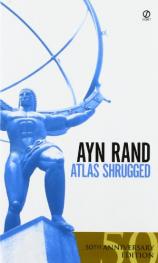
Atlas Shrugged by Ayn Rand
- Publication Date: September 1, 1996
- Mass Market Paperback: 1088 pages
- Publisher: Signet
- ISBN-10: 0451191145
- ISBN-13: 9780451191144
- About the Book
- Reading Guide (PDF)
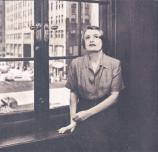
- How to Add a Guide
- Privacy Policy
- Cookie Policy
- Newsletters
Copyright © 2024 The Book Report, Inc. All Rights Reserved.
The Hidden Dominion
A Dissident Enclave
An Insane Read: Atlas Shrugged Book Review by Ayn Rand
September 4, 2018 By Kaisar
What Is Atlas Shrugged?

It is your classic dystopian novel (my favorite genre, if you haven’t caught on by all my other reviews). It highlights a well-functioning, self-sufficient country (USA) that later turns into a collectivist hellhole. IE: dystopia.
It follows the story of Dagny Taggart, as she struggles against “looters” (socialists) that seek to control all businesses and take all of their output in the name of the public good.
As the story progresses, more and more of the prime businessmen and women that created the well-functioning society just give up. In essence, they stop working altogether in protest against the looting.
As the strike continues to escalate, more and more of society collapses. Thus creating the dystopian mess that Ayn Rand depicts so vividly in Atlas Shrugged.
Who Is Ayn Rand?
Ayn Rand is a Russian/American author and philosopher that lived through collectivism in the Russian era.
She was a staunch proponent of individualism. So much so, she created the philosophical system known as “Objectivism”. This system purports that reality exists independently of consciousness, that we (humans) have direct contact with reality through logic. In addition, it holds that the highest moral purpose in life is the pursuit of one’s own happiness, within the confines of laissez-faire capitalism. While I do not agree with this mindset, it is still a unique book and a great read.
She also wrote Anthem, which I reviewed here: Anthem by Ayn Rand .
Why Is Atlas Shrugged Such An Interesting Read?
You’ll fall in love with the characters of this book. I rarely relate or care about people in novels, but Atlas Shrugged changed that. Between Dagny, Hank Rearden, Lillian, Eddie, and my personal favorite (Ragnar Danneskjold), there is a certain element of character development that seems sorely lacking compared to most other similar novels.
Ayn Rand wrote the novel in a common style writing, so every piece is highly readable. Which is essential, considering it is 1168 pages long. But don’t let the length scare you, just consider it a book to read for a little here and there. Before you know it, you’ll be hooked and wanting to power through, regardless of page count.
It’s also a novel that is still relevant today. It is particularly relevant with regard to the philosophical debate about collectivism that is present in the Western world. Everything in this book revolves around things such as freedom of speech (and thought), private property , private enterprise, entrepreneurship, and government regulatory oversight.
Then within this broad theme, we have many tidbits of spiritual reflection and even romantic interest.
In short, Atlas Shrugged contains a bit of everything. Moreover, when you figure out why “Atlas Shrugged”, you’ll have a little mind-blown moment from the unexpected twist.
Naturally, I don’t want to give any major plot points away. It would spoil the fun of the novel. But as you read through, pay close attention to the actions of Lillian. She plays background for a long time, but is one of the most interesting characters.
It is hard to imagine a more thought-provoking book that considers government structures and the collectivist nature. You can see a parallel in the modern movements of American society.
In summary, I am thrilled I tackled this mammoth of a text. It taught me a tremendous amount and has easily become one of my top three favorite books.
It’s not likely that this book will suit everyone, I get that. However, for the readers of this website, I’m positive you all would love it if you haven’t read it yet.
Also, you will never be able to look at a train or railroad track the same way again after reading this. So fair warning.
Personal Implications
Atlas Shrugged does require you to take a serious look at yourself and your actions. It is natural while reading through that you’ll contemplate yourself in the characters’ situations, and even begin to see the principles of the text in your everyday life.
It can be a bit of a “lecture” at points. And some people don’t like to be lectured or expand their thoughts outside of their bubble. This book forces that, so I get why some people (especially the socialist-minded) dislike it.
In over 1000+ pages, Ayn Rand teaches you to think with your mind, not your heart. This trait then results in actually being more caring and doing more good than thinking with just your heart.
In Ayn Rand’s perfect society, even teachers and stay at home moms were considered the “atlases” of the world. All it took were the right beliefs and the dedication to their own values to help them reach the peaks of their own happiness.
In short, if you can’t handle looking at your own imperfections and faults, don’t read it. But if you have an open mind and are willing to learn something while enjoying an outstanding storyline, grab a copy.
Atlas Shrugged Final Note on Size
A.S. is an affordable book, especially for the size. I always recommend getting a paperback or hardcover. Mass-market paperbacks are cheaper, but they are hard to read, as the book and text are small.
For a book the size of Atlas Shrugged, it’s best to go with a larger sized edition to make the reading easier.
I say this, but I actually bought the mass-market paperback because it was cheaper. So do whichever suits you.
The main key here is actually reading whichever style you buy.
Related Articles:

anacyclosis centralization centralizers christianity communism corruption covid culture culture war cycle of collapse degeneracy dissident economy elections elites enclavism evil experts finance fiscal funny geopolitics god government guns health history inflation leftism lgbt lies lifestyle mainstream media market media meme money morality philosophy politics prepping race religion socialism society united states vaccines voting war world

Whittaker Chambers’s Review of Ayn Rand’s Novel “Atlas Shrugged” in The National Review
by Michael Berliner | Nov 26, 2007 | POLITICS

The following is an revised excerpt from “Reviews of Atlas Shrugged,” a chapter in Essays on Ayn Rand’s “Atlas Shrugged” (ed. Robert Mayhew), due in 2009 from Lexington Books.
The most significant review of Atlas Shrugged from the political Right appeared in The National Review (December 28, 1957) and signaled the “official” conservative position. [1] The 2,700-word review was written by ex-Communist, Whittaker Chambers, and was republished on the National Review website in 2005 and yet again in 2007 on the occasion of the 50th anniversary of the publication of the novel. Chambers spent a good part of his review sneering at the novel, which he characterized as “remarkably silly,” “bumptious” and “preposterous”–a book that no sensible adult could take seriously. All of the characters, Chambers claimed, were mere caricatures, which, he concluded, spared Ayn Rand the necessity of explaining “how they came to exist at all”–this despite the fact that Rand’s novels are unusual, if not unique, in identifying and explaining the philosophic roots of her characters. Chambers’s review came across as so non-objective to Rand’s colleague Leonard Peikoff that he stated in his letter to the National Review (which they did not publish): “Mr. Chambers is an ex-Communist. He has attacked Atlas Shrugged in the best tradition of the Communists–by lies, smears, and cowardly misrepresentations. Mr. Chambers may have changed a few of his political views; he has not changed the method of intellectual analysis and evaluation of the Party to which he belonged.” [2]
It is noteworthy that the National Review wanted (and still wants) to go on record as seeing no redeeming value in what has become a classic and a favorite novel of so many Americans, from businessmen to Hollywood stars. [3] But even more important is Chambers’s attack on Ayn Rand’s ideas. His criticisms show how intent the National Review was (and is) to distance itself from Ayn Rand’s philosophy.
Chambers advanced the claim– popular mainly with the Left–that Ayn Rand is a Nietzschean, with political views leading to Nazism . “Miss Rand acknowledges a grudging [sic] debt to one, and only one, earlier philosopher: Aristotle. I submit that she is indebted, and much more heavily, to Nietzsche. Just as her operatic businessmen are, in fact, Nietzschean supermen, so her ulcerous leftists are Nietzsche’s ‘last men’. . . .” These supermen heroes are, according to Chambers, a “technocratic elite,” who will “head us into dictatorship, however benign, living and acting beyond good and evil, a law unto itself (as Miss Rand believes it should be). . . .” “From almost any page of Atlas Shrugged ,” he charges, “a voice can be heard, from painful necessity, commanding ‘To a gas chamber–go!'”
What are we to make of these charges? For one thing, it is impossible to take Chambers as an honest critic: he charges her with ideas (e.g., that some people are “beyond good and evil”) that she went to great lengths to denounce (both dramatically and in Galt’s speech), so it seems as though Chambers’s hatred of the book is beyond fact. But let us look briefly at some specifics. Is Ayn Rand’s philosophy Nietzschean? It is beyond the scope of this chapter to explain why the answer is “no.” Suffice it to say that–although, as a teenager in Soviet Russia, she was temporarily attracted to Nietzsche’s poetic paean to the individual–Rand soon realized that his philosophy was antithetical to hers, particularly his opposition to reason and his advocacy of determinism and of power over other people. “You are wrong,” she would write later to a fan, “when you see any parallel between my philosophy and Nietzsche’s.” [4] As to her views on dictatorship (and its philosophical antecedents), those views were too well-established even in 1957 to necessitate any refutation of Chambers’s claim. Her novella Anthem , published in 1937, established her credentials as anti-collectivist, and in 1942, Mussolini’s fascist government banned the Italian film of We the Living when the government realized that Rand was attacking collectivism per se, not merely Soviet Communism. By 1957, Ayn Rand was even more established as a champion of reason and individual rights, placing her in the tradition of the Founding Fathers and the Declaration of Independence. One might think that such ideas would endear her to the political Right–until one realizes that those ideas are precisely what the National Review conservatives oppose, as is evidenced by Chambers’s other criticisms of Atlas Shrugged .
Rand’s approach to ethics is not to Chambers’s liking, because “everybody [in Atlas Shrugged ] is either all good or all bad.” Of course, perhaps employing some dialectical logic from his past, he also claimed that her heroes were presented as being “beyond [my italics] good and evil.” Nevertheless, he is obviously opposed to Rand’s moral absolutism. He is also unsympathetic to her individualism, because it leaves “no other nexus between man and man other than naked self-interest,” a view he claims allies her with Marxism, although his criticism is almost identical to that leveled by Marx against individualism: “The concern of the French Constitution of 1793,” wrote Marx, “is with the freedom of man as an isolated monad withdrawing into itself. . . . The human right of freedom is not based on the connection of man with man but rather on the separation of man from man. It is this right of separation, the right of the limited individual, limited unto himself. . . .” [5] Beyond his sneers at “naked self-interest” and his attempt to turn her ethics upside-down by characterizing it as promoting a technocratic elite, Chambers makes no mention of her opposition to altruism or her identification of altruism as the ethical basis of dictatorship.
With respect to Ayn Rand’s views on knowledge, Chambers’s review is none too clear. His rejection of her absolutism regarding morality would likely apply to knowledge in general, but he doesn’t say so. However, he does charge her with advocating dogmatism and being “the bringer of a higher revelation.” Apparently Chambers believed that any advocacy of certainty must be taken as Revealed Truth and thus dogma. But what is Chambers’s alternative? We can’t be sure from the review. It is not the alternative offered by the liberals: skepticism. It is not reason, for nowhere does he laud the use of reason or chastise Ayn Rand for being anti-reason. In fact, his alternative to what he sees as Rand’s dogmatism is his own religious dogmatism, which he described five years earlier in the first chapter of Witness , the story of his rejection of Communism and of his testimony against Alger Hiss: “I am an involuntary witness to God’s grace and to the fortifying power of faith.” [6] The Communist, he wrote, cannot admit “that there is something greater than Reason, greater than the logic of the mind.” [7]
But it is with respect to Ayn Rand’s metaphysics–her view of the nature of man and reality–that Chambers saves his major criticism. The story of Atlas Shrugged , he writes, “serves Miss Rand to get the customers inside the tent, and as a soapbox for delivering her Message. The Message is the thing. It is, in sum, a forthright philosophical materialism.” This is a truly astounding claim and one explained only by holding, as Chambers clearly does, that anyone who is an atheist (i.e., does not accept the existence of invisible supernatural entities) is ipso facto a materialist. For Chambers, materialism is the only alternative to supernaturalism, a long-ago exposed false dichotomy that was at the heart of his rejection of Marxist philosophy: while gazing upon his infant daughter’s ear, he concluded that it couldn’t have been constructed by chance, and therefore there must be a Divine Plan (the possibility of a natural explanation eluding him). [8] In fact, materialism is the view that only physical matter exists; anything else, e.g., ideas, is reducible to physical matter. Thus Marx maintained “It is not the consciousness of men that determines their being, but, on the contrary, their social being that determines their consciousness.” [9] But, for Ayn Rand, consciousness is not reducible to matter or to anything else; it is an irreducible primary, as she made clear in Galt’s speech.. [10]
The actual theme of Atlas Shrugged , one that is obvious in virtually every page, is the role of the mind in human existence. Ayn Rand’s message is: human existence and progress depend on the mind, i.e., the independent thinking of those who choose to think. Marx’s materialism, which Chambers believes Ayn Rand accepts, is in direct contradiction to the message of Atlas Shrugged . The materialist (or labor) theory of value, a cornerstone of Marxism, is the direct opposite of Ayn Rand’s views on production: the pages of Atlas Shrugged are replete with the message that it is ideas and intellectual labor–not physical labor–that move the world.
Chambers’s philosophic foundations are revealed by his exploration of Ayn Rand’s supposed materialism: “Like any consistent materialism, this one begins by rejecting God, religion, original sin, etc. etc. . . . Thus Randian Man, like Marxian Man, is made the center of a godless world.” For Chambers, that’s all it takes. “The Communist vision,” he wrote in Witness , “is the vision of Man without God,” with “man’s mind replacing God as the creative intelligence of the world.” [11] Accepting the Marxist pretence at being pro-reason and pro-science, Chambers writes that “to the challenge of God or Man, [Communism] gives the answer: Man.” [12] So, despite its demand for blind obedience (to the Party), and its elevation of historical-economic forces over individual minds as the basic cause of human action, Communism is pro-reason–or so Chambers believes. Despite its decades of slavery and mass murder, Communism is pro-man–or so Chambers believes. Such are the blinders leading Chambers to lump Ayn Rand with Marxism. For there is, he recognizes, no other way to preserve religion. [13]
The irony of Chambers’s rejection of Communism in favor of Christianity is that the two are really philosophic brothers under the skin. Both advocate altruism (“from each according to his ability, to each according to his need” said Marx, echoing the Bible [14] ), reject free-will, demand obedience to an unseen entity (society or God). Both are–as Ayn Rand noted–“enemies of the independent mind.” [15]
From the time that Ayn Rand–at the age of nine–decided to become a fiction writer, her goal had been the creation of “the ideal man.” That ideal was first manifested in Howard Roark in The Fountainhead and culminated in the men and women of Atlas Shrugged . As she wrote in her postscript, “About the Author”: “My philosophy, in essence, is the concept of man as a heroic being, with his own happiness as the moral purpose of his life, with productive achievement as his noblest activity, and reason as his only absolute.” This view of man is at the heart of Chambers’s antipathy to Atlas Shrugged . The Christian view has no place for man as heroic or for life on earth as the ultimate happiness. The best that Chambers can provide as an alternative to what he thinks is Ayn Rand’s animalistic pursuit of happiness is tragedy, and he laments her view, in which man’s “tragic fate becomes, without God, more tragic and much lonelier.” [16] Chambers inaccurately summarizes the Marxist view as follows: “[Marxism] is the vision of man’s liberated mind, by the sole force of its rational intelligence, redirecting man’s destiny and reorganizing man’s life and the world.” [17] Chambers’s universe is so malevolent that he considers Marxism (with its horrific history) as benevolent by comparison with his own. Let’s take him at his word.
References:
[1] Whittaker Chambers, “Big Sister is Watching You,” National Review , December 28, 1957.
[2] Peikoff’s letter will be published for the first time in Essays on Ayn Rand’s “Atlas Shrugged. ”
[3] A 1991 survey by the Library of Congress found Atlas Shrugged to be second in influence only to the Bible.
[4] Ayn Rand, letter to Libby Parker, in Michael S. Berliner, ed., Letters of Ayn Rand (New York: Dutton), p. 614.
[5] Karl Marx, from “On the Jewish Question,” quoted in Eugene Kamenka, The Ethical Foundations of Marxism (New York: Praeger, 1962), p. 64.
[6] Whittaker Chambers, Witness (Washington, DC: Regnery Gateway, 1952), p. 6.
[7] Chambers, Witness , p. 15
[8] Chambers, Witness , p. 16.
[9] Karl Marx, Preface to “A Contribution to the Critique of Political Economy” in Kamenka, ed., The Portable Karl Marx (New York: Viking Penguin, 1983), p.160.
[10] See Ayn Rand, Atlas Shrugged (New York: Penguin, 1952), p. 933. For a discussion of Rand’s position, see Leonard Peikoff, Objectivism: the Philosophy of Ayn Rand (New York: Penguin, 1993), p. 4ff.
[11] Chambers, Witness , p. 9.
[12] Chambers, Witness , p. 13.
[13] M. Stanton Evans, in his 1967 critique of Ayn Rand in The National Review lamented that she tried to justify capitalism without its supposedly necessary base, i.e. “the Christian culture which has given birth to all our freedoms.” M. Stanton Evans, “The Gospel According to Ayn Rand,” National Review , October 3, 1967, quoted in Nash, p. 541.
[14] Karl Marx, “Critique of the Gotha Program” in Kamenka, ed., Portable Karl Marx , p. 541. And from the Bible: “And all that believed were together, and had all things common; And sold their possessions and goods, and parted them to all men, as every man had need. (Acts 2:44-45) … Neither was there any among them that lacked: for as many as were possessors of lands or houses sold them, and brought the prices of the things that were sold, and laid them down at the apostles’ feet: and distribution was made unto every man according as he had need.” (Acts 4:34-35).
[15] Ayn Rand, letter to Stephen Sipos, in Berliner, p. 565. For the similarities in the two supposedly-opposed views, see Leonard Peikoff, “Religion vs. America,” in Ayn Rand, The Voice of Reason (New York: New American Library, 1989), pp. 76-77.
[16] Gary Wills, as part of National Review’s ongoing angst over Ayn Rand and Atlas Shrugged , echoed this tragic view of man: “When [John] Galt asserts the immediate perfectibility of man . . . he is working from the first principle of historical Liberalism,” in contrast to conservatism. Gary Wills, “But is Ayn Rand Conservative?” National Review , February 27, 1960, quoted in Nash, p. 241.
[17] Chambers, Witness , p. 9.
Michael Berliner
The views expressed above represent those of the author and do not necessarily represent the views of the editors and publishers of Capitalism Magazine . Capitalism Magazine sometimes publishes articles we disagree with because we think the article provides information, or a contrasting point of view, that may be of value to our readers.
Have a comment?
Related articles

Trump’s Proposal To Replace The Federal Income Tax with Tariffs
If Trump’s goal is simply to eliminate the federal income tax, then he should advocate for doing that and only that.

You Keep Using the Term ‘Authoritarian’
There is nothing in the Constitution about a vast army of bureaucrats who rule behind the scenes that is in no way reachable or manageable by elected representatives.

Trump Gag Order Violates Your Freedom of Speech
Mr. Trump isn’t the only victim of this ill-advised gag order. It violates your First Amendment rights and mine as well.
Subscribe for free.
Read by students, professors, and citizens, Capitalism Magazine provides over 9,000 free to read articles and essays from pro-reason, individual rights perspective.
No spam. Unsubscribe anytime.
Pin It on Pinterest
Advertisement
Supported by
Three Blockbuster Novels From the 1950s, and Their Remarkable Afterlife
- Share full article
By Sam Tanenhaus
- Sept. 12, 2018
Why are Russians so good at vexing American minds? Vladimir Putin’s bewitchment of President Trump continues to frustrate intelligence officials and at times hard-liners in his own administration, while pro- and anti-Russia journalists trade insults as enthusiastically as they did during the 1950s Rosenberg spy trial.
Beneath this lurks the uneasy feeling that our longtime superpower adversary remains our secret twin, matching us in audacity and ambition, just as it did all those years ago. “Listen now,” an NBC radio announcer declared in October 1957, “for the sound which forever more separates the old from the new.” The sound was the beep-beep of the radio signal emitted by Sputnik , the first satellite sent into space, as it streaked on its elliptical path at a surreal velocity of 18,000 miles per hour. The Russians’ early conquest of space came as a shock — “perhaps the darkest hour of the Cold War,” one historian has written — but it was also an exciting communal moment: Americans stumbled out of bed to watch “the sunlit speck sweep across the predawn sky,” Time reported, “as steady in its orbit as the made-by-nature moon.”
The “space race” was a competition, but with only two rivals — “us” and “them.” And this odd partnership, or dance, spilled over into realms of the imagination, particularly the novel. In the aftermath of Sputnik three towering and best-selling works of fiction by dissident Russians — “Atlas Shrugged,” “Lolita” and “Doctor Zhivago” — were published in quick succession, crowded into an 11-month span, from October 1957 to September 1958. Today, all three still live on, each a universe in itself, read and discussed — and fought over — as if written not in prose but in hieroglyphics or code.
Published less than a week after the Sputnik launch, “Atlas Shrugged” was the crowning work of Ayn Rand , a Jewish émigré from St. Petersburg (born Alissa Rosenbaum) who had gone to Hollywood in the 1920s, taking with her scenarios even Cecil B. DeMille’s story department deemed far-fetched. It was there that she developed an almost militant faith in capitalism. Her novel “The Fountainhead,” published in 1943, though panned by reviewers, became a word-of-mouth sales triumph and then a film starring Gary Cooper as a visionary architect modeled on Frank Lloyd Wright.
Since then Rand had carefully tended her own growing legend. The immense “Atlas Shrugged” (1,168 pages) was famous even before it was published — the fruit of 13 years of intense work — with amphetamine-driven live readings for her entranced circle, or cult, of young acolytes, who gathered at her apartment in Manhattan.
We are having trouble retrieving the article content.
Please enable JavaScript in your browser settings.
Thank you for your patience while we verify access. If you are in Reader mode please exit and log into your Times account, or subscribe for all of The Times.
Thank you for your patience while we verify access.
Already a subscriber? Log in .
Want all of The Times? Subscribe .

Join Our Newsletter!
Atlas shrugged.

Peopled by larger-than-life heroes and villains, charged with towering questions of good and evil, Atlas Shrugged is Ayn Rand’s magnum opus: a philosophical revolution told in the form of an action thriller—nominated as one of America’s best-loved novels by PBS’s The Great American Read .
Who is John Galt? When he says that he will stop the motor of the world, is he a destroyer or a liberator? Why does he have to fight his battles not against his enemies but against those who need him most? Why does he fight his hardest battle against the woman he loves?
You will know the answer to these questions when you discover the reason behind the baffling events that play havoc with the lives of the amazing men and women in this book. You will discover why a productive genius becomes a worthless playboy...why a great steel industrialist is working for his own destruction...why a composer gives up his career on the night of his triumph...why a beautiful woman who runs a transcontinental railroad falls in love with the man she has sworn to kill.
Atlas Shrugged , a modern classic and Rand’s most extensive statement of Objectivism—her groundbreaking philosophy—offers the reader the spectacle of human greatness, depicted with all the poetry and power of one of the twentieth century’s leading artists.

- Biggest New Books
- Non-Fiction
- All Categories
- First Readers Club Daily Giveaway
- How It Works

"Excruciatingly awful": On Ayn Rand's Atlas Shrugged
Strong opinions from the national review.
- Share on Facebook (Opens in new window)
- Click to share on Twitter (Opens in new window)
- Click to share on Google+ (Opens in new window)
- Click to share on LinkedIn (Opens in new window)
- Click to share on Reddit (Opens in new window)
- Click to share on Tumblr (Opens in new window)
- Click to share on Pinterest (Opens in new window)
- Click to share on Pocket (Opens in new window)

Run for your life from any man who tells you that money is evil.
That sentence is the leper’s bell of an approaching looter .
“The news about this book seems to me to be that any ordinarily sensible head could not possibly take it seriously, and that, apparently, a good many do. Somebody has called it: ‘Excruciatingly awful.’ I find it a remarkably silly book. It is certainly a bumptious one. Its story is preposterous. It reports the final stages of a final conflict (locale: chiefly the United States, some indefinite years hence) between the harried ranks of free enterprise and the ‘looters.’ These are proponents of proscriptive taxes, government ownership, labor, etc., etc. The mischief here is that the author, dodging into fiction, nevertheless counts on your reading it as political reality. ‘This,’ she is saying in effect, ‘is how things really are. These are the real issues, the real sides. Only your blindness keeps you from seeing it, which, happily, I have come to rescue you from.’
Since a great many of us dislike much that Miss Rand dislikes, quite as heartily as she does, many incline to take her at her word. It is the more persuasive, in some quarters, because the author deals wholly in the blackest blacks and the whitest whites. In this fiction everything, everybody, is either all good or all bad, without any of those intermediate shades which, in life, complicate reality and perplex the eye that seeks to probe it truly. This kind of simplifying pattern, of course, gives charm to most primitive storyknown as: The War between the Children of Light and the Children of Darkness. In modern dress, it is a class war. Both sides to it are caricatures.

“…the strenuously sterile world of Atlas Shrugged is scarcely a place for children. You speculate that, in life, children probably irk the author and may make her uneasy. How could it be otherwise when she admiringly names a banker character (by what seems to me a humorless master-stroke): Midas Mulligan? You may fool some adults; you can’t fool little boys and girls with such stuff–not for long. They may not know just what is out of line, but they stir uneasily. The Children of Darkness are caricatures, too; and they are really oozy. But at least they are caricatures of something identifiable. Their archetypes are Left-Liberals, New Dealers, Welfare Statists, One Worlders, or, at any rate, such ogreish semblances of these as may stalk the nightmares of those who think little about people as people, but tend to think a great deal in labels and effigies.
In Atlas Shrugged , all this debased inhuman riffraff is lumped as ‘looters.’ This is a fairly inspired epithet. It enables the author to skewer on one invective word everything and everybody that she fears and hates. This spares her the playguy business of performing one service that her fiction might have performed, namely: that of examining in human depth how so feeble a lot came to exist at all, let alone be powerful enough to be worth hating and fearing. Instead, she bundles them into one undifferentiated damnation.

“So the Children of Light win handily by declaring a general strike of brains, of which they have a monopoly, letting the world go, literally, to smash. In the end, they troop out of their Rocky Mountain hideaway to repossess the ruins. It is then, in the book’s last line, that a character traces in the dir, over the desolate earth, the Sign of the Dollar, in lieu of the Sign of the Cross, and in token that a suitably prostrate mankind is at last ready, for its sins, to be redeemed from the related evils of religion and social reform (the ‘mysticism of mind’ and the ‘mysticism of muscle’). That Dollar Sign is not merely provocative, though we sense a sophomoric intent to raise the pious hair on susceptible heads. More importantly, it is meant to seal the fact that mankind is ready to submit abjectly to an elite of technocrats, and their accessories, in a New Order, enlightened and instructed by Miss Rand’s ideas that the good life is one which ‘has resolved personal worth into exchange value,’ ‘has left no other nexus between man and man than naked selfinterest, than callous “cash-payment.”‘ The author is explicit, in fact deafening, about these prerequisites. Lest you should be in any doubt after 1,168 pages, she assures you with a final stamp of the foot in a postscript: ‘And I mean it.’
“Atlas Shrugged can be called a novel only by devaluing the term. It is a massive tract for the times. Its story merely serves Miss Rand to get the customers inside the tent, and as a soapbox for delivering her Message. The Message is the thing. It is, in sum, a forthright philosophic materialism.
“Randian Man, at least in his ruling caste, has to be held ‘heroic’ in order not to be beastly. And this, of course, suits the author’s economics and the politics that must arise from them. For politics, of course, arise, though the author of Atlas Shrugged stares stonily past them, as if this book were not what, in fact, it is, essentially–a political book. And here begins mischief. Systems of philosophic materialism, so long as they merely circle outside this world’s atmosphere, matter little to most of us. The trouble is that they keep coming down to earth. It is when a system of materialist ideas presumes to give positive answers to real problems of our real life that mischief starts. In an age like ours, in which a highly complex technological society is everywhere in a high state of instability, such answers, however philosophic, translate quickly into political realities. And in the degree to which problems of complexity and instability are most bewildering to masses of men, a temptation sets in to let some species of Big Brother solve and supervise them.

“Out of a lifetime of reading, I can recall no other book in which a tone of overriding arrogance was so implacably sustained. Its shrillness is without reprieve. Its dogmatism is without appeal. In addition, the mind which finds this tone natural to it shares other characteristics of its type. 1) It consistently mistakes raw force for strength, and the rawer the force, the more reverent the posture of the mind before it. 2) It supposes itself to be the bringer of a final revelation. Therefore, resistance to the Message cannot be tolerated because disagreement can never be merely honest, prudent, or just humanly fallible. Dissent from revelation so final (because, the author would say, so reasonable) can only be willfully wicked. There are ways of dealing with such wickedness, and, in fact, right reason itself enjoins them. From almost any page of Atlas Shrugged , a voice can be heard, from painful necessity, commanding: ‘To a gas chamber–go!’
“…we cannot help feeling at least a sympathetic pain before the sheer labor, discipline, and patient craftsmanship that went to making this mountain of words. But the words keep shouting us down. In the end that tone dominates. But it should be its own antidote, warning us that anything it shouts is best taken with the usual reservations with which we might sip a patent medicine. Some may like the flavor. In any case, the brew is probably without lasting ill effects. But it is not a cure for anything. Nor would we, ordinarily, place much confidence in the diagnosis of a doctor who supposes that the Hippocratic Oath is a kind of curse.”
– Whittaker Chambers, The National Review , December 28, 1957
Share this:
- Click to share on Facebook (Opens in new window)

Get the Book Marks Bulletin
Email address:
- Categories Fiction Fantasy Graphic Novels Historical Horror Literary Literature in Translation Mystery, Crime, & Thriller Poetry Romance Speculative Story Collections Non-Fiction Art Biography Criticism Culture Essays Film & TV Graphic Nonfiction Health History Investigative Journalism Memoir Music Nature Politics Religion Science Social Sciences Sports Technology Travel True Crime
June 24 – 28, 2024

- The hottest new trend in publishing: Monster smut
- The Baillie Gifford boycotts and the necessity of sustainable, ethical sources of arts funding
- Kevin Nguyen on what Game of Thrones did to media
Log in or sign up for Rotten Tomatoes
Trouble logging in?
By continuing, you agree to the Privacy Policy and the Terms and Policies , and to receive email from the Fandango Media Brands .
By creating an account, you agree to the Privacy Policy and the Terms and Policies , and to receive email from Rotten Tomatoes and to receive email from the Fandango Media Brands .
By creating an account, you agree to the Privacy Policy and the Terms and Policies , and to receive email from Rotten Tomatoes.
Email not verified
Let's keep in touch.

Sign up for the Rotten Tomatoes newsletter to get weekly updates on:
- Upcoming Movies and TV shows
- Trivia & Rotten Tomatoes Podcast
- Media News + More
By clicking "Sign Me Up," you are agreeing to receive occasional emails and communications from Fandango Media (Fandango, Vudu, and Rotten Tomatoes) and consenting to Fandango's Privacy Policy and Terms and Policies . Please allow 10 business days for your account to reflect your preferences.
OK, got it!
- What's the Tomatometer®?
- Login/signup
Movies in theaters
- Opening this week
- Top box office
- Coming soon to theaters
- Certified fresh movies
Movies at home
- Fandango at Home
- Netflix streaming
- Prime Video
- Most popular streaming movies
- What to Watch New
Certified fresh picks
- A Quiet Place: Day One Link to A Quiet Place: Day One
- Inside Out 2 Link to Inside Out 2
- Daddio Link to Daddio
New TV Tonight
- The Bear: Season 3
- My Lady Jane: Season 1
- Land of Women: Season 1
- Orphan Black: Echoes: Season 1
- Supacell: Season 1
- That '90s Show: Season 2
- Savage Beauty: Season 2
- WondLa: Season 1
- Zombies: The Re-Animated Series: Season 1
Most Popular TV on RT
- Star Wars: The Acolyte: Season 1
- The Boys: Season 4
- Presumed Innocent: Season 1
- Dark Matter: Season 1
- House of the Dragon: Season 2
- Best TV Shows
- Most Popular TV
- TV & Streaming News
Certified fresh pick
- My Lady Jane: Season 1 Link to My Lady Jane: Season 1
- All-Time Lists
- Binge Guide
- Comics on TV
- Five Favorite Films
- Video Interviews
- Weekend Box Office
- Weekly Ketchup
- What to Watch
Kevin Costner’s Best Movies and Shows Ranked by Tomatometer
Best Movies of 2024: Best New Movies to Watch Now
What to Watch: In Theaters and On Streaming
The Bear : Season 3 First Reviews: Still One of the Best Shows on TV
A Quiet Place: Day One First Reviews: A Tense, Surprisingly Tender Thriller Anchored by Fantastic Performances
- Trending on RT
- Best Movies
- July's Anticipated Movies
- A Quiet Place: Day One
Atlas Shrugged: Part 1
Where to watch.
Rent Atlas Shrugged: Part 1 on Prime Video, or buy it on Prime Video.
What to Know
Passionate ideologues may find it compelling, but most filmgoers will find this low-budget adaptation of the Ayn Rand bestseller decidedly lacking.
Critics Reviews
Audience reviews, cast & crew.
Paul Johansson
Taylor Schilling
Dagny Taggart
Edi Gathegi
Eddie Willers
Michael O'Keefe
Hugh Akston
Matthew Marsden
James Taggart
More Like This
Related movie news.

IMAGES
VIDEO
COMMENTS
Read 20,179 reviews and ratings of Atlas Shrugged, a novel that presents a philosophical revolution and a mystery story of human life. Learn about the author, the book details, the genres, and the community discussions on Goodreads.
Ayn Rand's novel "Atlas Shrugged" has polarized opinion for more than 50 years. Its fans — including, until recently, vice presidential candidate Paul Ryan — applaud the book's ...
Today is the sixty-sixth publication anniversary of Ayn Rand's 1100-page magnum opus of unreadable doggerel libertarian science fiction, Atlas Shrugged. Set in a dystopian United States in which private businesses suffer under increasingly burdensome laws and regulations (isn't it always the way), it's the story of railroad executive ...
Atlas Shrugged is a 1957 novel by Ayn Rand.It is her longest novel, the fourth and final one published during her lifetime, and the one she considered her magnum opus in the realm of fiction writing. She described the theme of Atlas Shrugged as "the role of man's mind in existence" and it includes elements of science fiction, mystery and romance.The book explores a number of philosophical ...
A 1957 review of Rand's dystopian novel, praising its storytelling but criticizing its characters and philosophy. The reviewer compares the book to The Fountainhead and anticipates its popularity and controversy.
Atlas Shrugged by Ayn Rand is populated with several diverse, well-developed characters. One such individual, Dagny Taggart, is a personal favorite. Superficiality aside, I love her for her unwavering convictions and determination, despite the fact that her somewhat shady actions oftentimes prove detrimental to her reputation (not that she cares.)
Atlas Shrugged book review. Date: September 4, 2022 Author: Ahaqir 9 Comments. Ayn Rand's Atlas Shrugged is a long but enjoyable read about how government shouldn't interfere with independent businesses or they will leave. Treat it as any other novel instead of focusing on the message Rand is trying to get across in her last published novel.
Atlas Shrugged. Paperback - September 1, 1996. Peopled by larger-than-life heroes and villains, charged with towering questions of good and evil, Atlas Shrugged is Ayn Rand's magnum opus: a philosophical revolution told in the form of an action thriller—nominated as one of America's best-loved novels by PBS's The Great American Read.
Atlas Shrugged. Paperback - August 1, 1999. by Ayn Rand (Author), Leonard Peikoff (Introduction) 4.5 20,314 ratings. See all formats and editions. Peopled by larger-than-life heroes and villains, charged with towering questions of good and evil, Atlas Shrugged is Ayn Rand's magnum opus: a philosophical revolution told in the form of an ...
A review of Rand's last and longest novel, a dystopian tale of capitalism, individualism, and love. The review covers the plot, the characters, the themes, and the reception of the book, as well as some snarky and mixed reviews.
Author interviews, book reviews and lively book commentary are found here. Content includes books from bestselling, midlist and debut authors. The Book Report Network. Our Other Sites. Bookreporter; ... Explain the meaning and wider significance of the following quote from Atlas Shrugged: "The words 'to make money' hold the essence of human ...
A dystopian novel that depicts a society where businessmen and women stop working due to socialist looting. The author, Ayn Rand, is a proponent of individualism and objectivism, and the book explores themes of freedom, happiness, and morality.
BOOK REVIEW: Edward W. Younkins, Editor, Ayn Rand's Atlas Shrugged: A Philosophical and Literary Companion (Ashgate Publishing, Aldershot, Hampshire, UK 2007) 431 pages, $24.95 (paperback). Ayn Rand's Atlas Shrugged is a collection of thirty-six essays on Rand's monumental novel and its meaning. The essays range from basic primers and plot summaries—competent book reports, more than ...
Ayn Rand. Polemical novels, such as The Fountainhead (1943), of primarily known Russian-American writer Ayn Rand, originally Alisa Rosenbaum, espouse the doctrines of objectivism and political libertarianism. Fiction of this better author and philosopher developed a system that she named. Educated, she moved to the United States in 1926.
The following is an revised excerpt from "Reviews of Atlas Shrugged," a chapter in Essays on Ayn Rand's "Atlas Shrugged" (ed. Robert Mayhew), due in 2009 from Lexington Books.. The most significant review of Atlas Shrugged from the political Right appeared in The National Review (December 28, 1957) and signaled the "official" conservative position.
Sexual sin was a familiar subject in the late 1950s. The period's best sellers included "Peyton Place," "By Love Possessed" and "Anatomy of a Murder.". But these were all ...
From original review in the Ogden Standard-Examiner, October, 1957, by Luise Putcamp, Jr.: Ayn Rand has an idea about what could go wrong with this country, and she has built herself an impressive soap box in a 1,168-page novel called Atlas Shrugged. In Miss Rand's book the country is curiously desolate, as in a depression.
Peopled by larger-than-life heroes and villains, charged with towering questions of good and evil, Atlas Shrugged is Ayn Rand's magnum opus: a philosophical revolution told in the form of an action thriller—nominated as one of America's best-loved novels by PBS's The Great American Read. Who is John Galt?When he says that he will stop the motor of the world, is he a destroyer or a ...
#atlasshrugged #aynrand #explained Radical Reviewer taking a look at Atlas Shrugged by Ayn Rand critiquing the story and comparing its themes to Umberto Eco'...
Atlas Shrugged. Run for your life from any man who tells you that money is evil. That sentence is the leper's bell of an approaching looter. "The news about this book seems to me to be that any ordinarily sensible head could not possibly take it seriously, and that, apparently, a good many do. Somebody has called it: 'Excruciatingly awful
Rent Atlas Shrugged: Part 1 on Prime Video, or buy it on Prime Video. Passionate ideologues may find it compelling, but most filmgoers will find this low-budget adaptation of the Ayn Rand ...